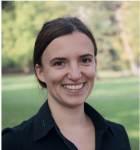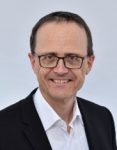Keynote 1 (Mittwoch)
Janet Siegmund: New Perspectives on the Human Factor in Software Engineering

The human factor in software engineering plays a major role, as humans implement software. However, it still lacks sufficient attention from the software engineering research community. Novel techniques, such as fMRI, EEG, and eye tracking, enable a new perspective on how programmers work with code. This has led to new insights that affect not only professional activities, but also teaching programming. With the advent of ChatGPT and other large language models, the human factor needs even more attentation, since the interaction with large language models redefine how programmers work and how we teach programming. In my talk, I will highlight the importance and obtained insights from research in this area.
About the Speaker: Janet Siegmund is professor for Software Engineering at the Chemnitz University of Technology. Prior to that, she led the junior research group PICCARD, funded by the Centre Digitisation.Bavaria. She received her Ph.D. from the University of Magdeburg in 2012 and she holds two master’s degrees, one in Computer Science and one in Psychology. In her research, she focuses on the human factor in software engineering, for example, when writing source code. Janet Siegmund is the co-author of more than 70 peer-reviewed journal, conference, and workshop publications. She regularly serves as program-committee member or chair for conferences and workshops. From 2014 to 2017, she was in the steering committee of the International Conference on Program Comprehension. Her work received several distinguished paper awards (ICSE, FSE, SANER) and two Most Influential Paper Awards (ICPC, GPCE).
Keynote 2 (Donnerstag)
Bernd Greifeneder: How Dynatrace innovates at scale – A story of bold choices and research-driven creativity

Scaling an organization is not easy, especially when you double the number of talents more than 10 times for all to find a meaningful way to practice innovation and at the same time grow business. We will tackle the often-central question around the innovator’s dilemma of creating new technology at an unprecedented scale and building a profitable organization that reinvents itself with each growth stage and provides global opportunities.
Dynatrace has been a trailblazer in applying AI to observability and security, starting almost a decade ago with the release of Dynatrace AI engine – Davis, that runs the Dynatrace platform and sets the future market standard – hypermodal AI, including predictive, causal and generative AI. This is the story of Dynatrace, a leader in the observability and security domain that has made bold choices to re-invent the wheel and win.
Bernd Greifeneder, Founder and CTO of Dynatrace, will share how Dynatrace was scaled and innovated over the years. He will talk about the lessons learned and the new possibilities that have emerged thanks to the collaboration with research talents from the University whose work has been integrated into our product. He will also discuss how the role of software engineering today is shaping the global innovation landscape.
About the Speaker: As founder and Chief Technology Officer (CTO), Bernd Greifeneder drives the Dynatrace product vision into the future, always staying one step ahead of the status quo. His mission: to help the world’s largest organizations to perfect their digital services so that millions of people have secure, performant, and intuitive digital user experiences. Greifeneder is a serial entrepreneur and visionary creator. The computer science graduate of Johannes Kepler University Linz brings more than 20 years of experience in software R&D leadership positions and nine patented inventions with him. Always ready for the next adventure, he combines performance with technology also in his private life, when he races across the water on his hydrofoil catamaran.
Keynote 3 (Freitag)
Hermann Sikora: Sind wir bereit für die Software Factory?
Download Vortragsfolien

Die Evolution der Software-Entwicklung von einer handwerklichen zu einer Ingenieursdisziplin steht im Mittelpunkt des Software Engineerings. Jedes neue Sprachen-Paradigma der letzten Jahrzehnte brachte Herausforderungen für das Software Engineering und die zugehörige Lehre mit sich. Die erfolgreiche Skalierung von Software-Engineering-Methoden für das „Programming-in-the-Large“, also die Software-Entwicklung im industriellen Maßstab, wird von vielen als Königsdisziplin des Software Engineerings verstanden. Zuletzt tauchte der Begriff der „Software Factory“ auf, primär im industriellen Umfeld. Macht der Begriff Sinn? Was sagt er aus und sind wir bereit für die Erwartungshaltungen, die mit ihm einhergehen? Und werden die dramatischen Entwicklungen, die das Thema der (generativen) Künstlichen Intelligenz mit sich bringt, nicht ohnehin auch das Software Engineering sowohl in der Wissenschaft als auch in der Industrie „auf den Kopf stellen“? Der Vortrag erörtert diese Fragestellungen aus einer Management-Perspektive. Begriffe werden geklärt, historische und aktuelle Erfolgsfaktoren aufgezeigt sowie Erwartungshaltungen für die Zukunft abgeleitet – und auch der potenzielle Impact der generativen KI auf das Software Engineering im industriellen Maßstab thematisiert.
Über den Vortragenden: Hermann Sikora ist Vorsitzender der Geschäftsführung der Raiffeisen Software GmbH und Sprecher der Geschäftsführung der RAITEC GmbH. Die Geschäftsführungspositionen hält er seit 1994 inne. Weiters ist er Vorsitzender des Beirates der Programmierfabrik GmbH. Er ist weiters u.a. Mitglied des Vorstandes des Instituts für Personal- und Organisationsentwicklung (IPO) an der Universität Linz und kooptiertes Mitglied des Vorstandes der Österreichischen Computer Gesellschaft (OCG). Seit 2006 ist Hermann Sikora Honorar-Professor für Information Engineering an der JKU. Sein Forschungsschwerpunkt ist IT-Management.